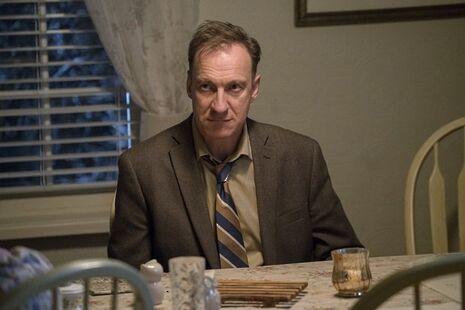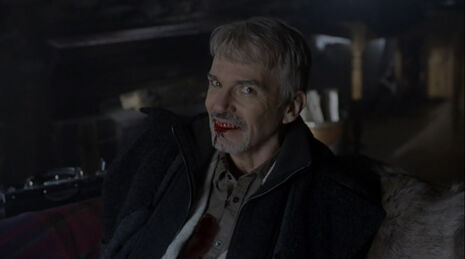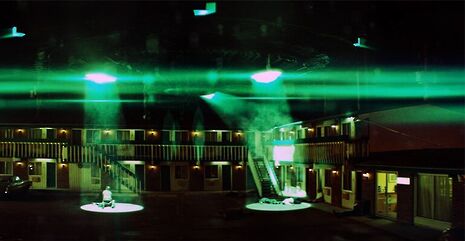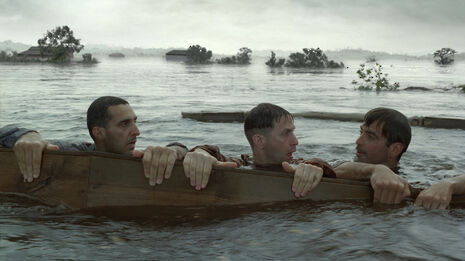Questioning the climax: Reflecting on Fargo
With the third season of Fargo ending on a typically uncertain note, Reuben Andrews considers the art of the ambiguous finale in a wider Coen context. Warning: this article discusses key plot points.

“The future is certain. And when it comes, you will know without question your place in the world. Until then, we’ve said all there is to say. Any further debate will be simply wasting our breath – and if there’s one thing I can’t abide, it’s waste. Goodbye.”
So utters David Thewlis’s bulimic spectre of late-capitalism, V.M. Varga, as he rounds off Fargo’s third, and potentially final, season. And what a fitting farewell it is, to a series that has taken as its central themes the flexibility of truth and the corruption of wealth (not too subtle, given recent climates). In our last moments, Varga sits in custody with insurmountable evidence against him, asserting that he will go free, whilst our protagonist, Gloria Burgle, insists that he will be incarcerated. While awaiting resolution, the screen fades to black.
“Fargo has conversely become so much more incisive in its exploration of the human condition, and of our economic and political milieu.”
Surely this is the burning epicentre of what Noah Hawley’s Fargo has always been striving to become: the fact that it could be held for a mere five minutes before snuffing out is proof of that. To some, ambiguous endings like this are narrative sacrilege, because, ultimately, they elevate the theme and message of a story above its plot. But Fargo has always been heading here, steadily growing more symbolic as it has found itself.

The first season was almost entirely straightforward. Perhaps the only presence of theme encroaching upon plot was antagonist Lorne Malvo’s line about having inhabited the Garden of Eden and an apparition of a wolf accompanying him later on. The second season’s most flagrant disregard for plot integrity was the deus ex machina appearance of a UFO in the penultimate episode, crystallising the Camus-born absurdist overtones and tapping into 1970s folklore.
However, Fargo only truly came into its own in season three – having an entire episode set in LA, unrelated to the main plot, to make a point about dead ends and the ambiguity of symbols; giving half an episode over to a bowling alley, transparently acting as purgatory, whilst Ray Wise of Twin Peaks fame plays a form of Jewish deity; and even the sci-fi-esque inclusion of quantum physics to explain character behaviours (by fading out of frame, perhaps Varga is both incarcerated and free at the same time, at least until he is observed, that is).
“Fargo is part mirror, part crystal ball – a reflection of our times, and a premonition of those to come lest we take action.”
All that might sound crazy or pretentious. But, in becoming more surreal in its delivery, Fargo has conversely become so much more incisive in its exploration of the human condition, and of our economic and political milieu. What better way to explore the tension of post-truth politics than leave the conflict of reality and fiction uncertain? What better way to explore the sudden and all-enveloping corporatism of the ’80s than with an arbitrary and incomprehensible UFO securing the demise of the last member of a small business? (OK, so that business was organised crime – but still).

If one had been informed three months ago that season three of Fargo would shape up to be the epic of our times, one would have been, quite rightly, doubtful. But the further the weeks progressed, the clearer it became that this what Hawley was moving towards all along. Fargo is part mirror, part crystal ball – a reflection of our times, and a premonition of those to come lest we take action.
“Take a regular schmuck who makes one wrong decision, an outside force of evil that takes advantage, and watch as the ensuing chaos splinters a community.”
Fargo apes the poetic justice of the epics in the way that its antagonists are brought down by exactly the values they extoll. In season one, Malvo, who seemed intent only on bringing out the bad in people, died at the hands of one of the meekest characters to ever grace network TV, Gus Grimly, after pushing him towards murder. In season two’s finale, the meticulous Mike Mulligan is ‘promoted’ in his mafia syndicate to a middle-manager who spends all day in a milquetoast corporate office, above the muck and exhilaration of his previous ground job. And our latest baddie, Varga, who treats the truth with such contempt that it may as well be meaningless, is left in cinematic limbo, neither free nor incarcerated.

But this taps into something deeper that Hawley shares with the Coen brothers – characters who are themselves far more than the flesh and blood they inhabit, characters who do not represent fictional people, rather embodiments of themes, feelings, concepts. Take Anton Chigurh from No Country for Old Men for instance: surely Cormac McCarthy’s antagonist appealed to the Coens for precisely this reason, that he is not meant to be taken literally, but rather as a wandering reminder of fate. Fargo’s villains are no different. And when one thinks about it, is this not echoing the most primordial of story-telling tactics? The Greek gods of Homer were themselves no more than poster-boys for integral parts of life: Hera, Goddess of Marriage; Demeter, Goddess of Agriculture; Ares, God of War.
Additionally, the repetitious nature of these old epics is itself present in the series. Experienced as a whole, the circularity of Fargo is utterly chilling. Take a regular schmuck who makes one wrong decision, an outside force of evil that takes advantage, and watch as the ensuing chaos splinters a community. Again and again. All three series, and the original 1996 film, follow this pattern. And they are collectively strengthened by this mantra-like structure.
When one considers that the Coens are no strangers to the epic themselves, literally retelling The Odyssey in O Brother, Where Art Thou?, it seems no coincidence that something borne from their own creative genius, albeit nurtured by another, would come to flourish in a similar way.
In closing, perhaps Michael Stuhlbarg’s unfortunate Sy Feltz should be considered. Sy, one of the only characters with a real opportunity to damage the gluttonous and seditious force of Varga, is poisoned late in the series after spending far too long umming and ahhing over any form of decisive action. Although previously a talkative and boisterous soul, he is left a stuttering brain-damaged shell. If there is one thing Fargo has to tell us, it is to not end up like Sy. Never acquiesce in the face of corruption, and never cease speaking out for what one believes in
 News / Cambridge academics sign open letter criticising research funding changes22 February 2026
News / Cambridge academics sign open letter criticising research funding changes22 February 2026 News / Supporters protest potential vet school closure22 February 2026
News / Supporters protest potential vet school closure22 February 2026 News / University Council rescinds University Centre membership20 February 2026
News / University Council rescinds University Centre membership20 February 2026 News / Hundreds of Cambridge academics demand vote on fate of vet course20 February 2026
News / Hundreds of Cambridge academics demand vote on fate of vet course20 February 2026 Comment / A tongue-in-cheek petition for gowned exams at Cambridge 21 February 2026
Comment / A tongue-in-cheek petition for gowned exams at Cambridge 21 February 2026








